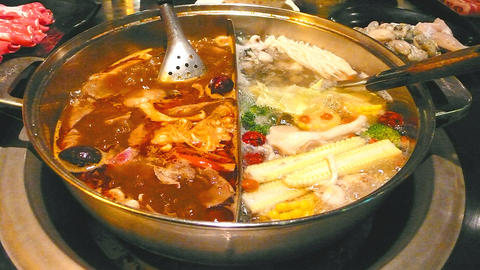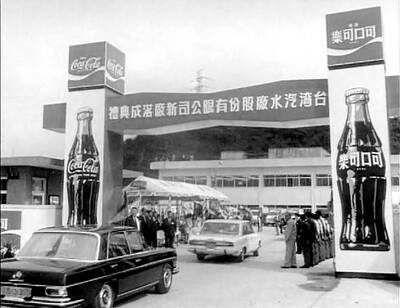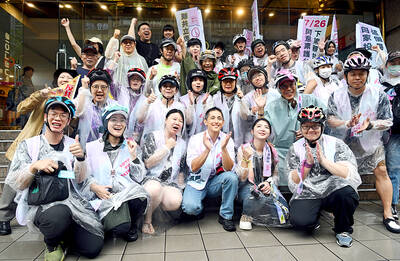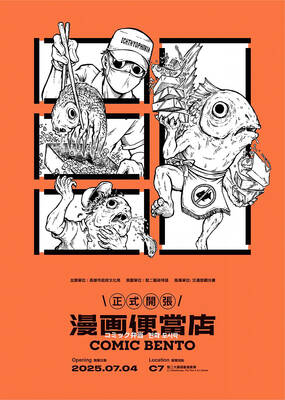Mala Yuanyang Hot Pot (馬辣鴛鴦火鍋)
Address: 86, Dingzhou Rd Sec 3, Taipei (台北市汀州路三段86號)
Telephone: (02) 2365-7625

PHOTO: HO YI,TAIPEI TIMES
Open: Daily from 11:30am to 5am
Average meal: NT$359 from 11:30am to 4pm; NT$399 on holidays and weekdays from 4pm to 5am, plus 10 percent service charge
Details: Menu in Chinese; credit cards not accepted
On the Net: www.mala-1.com.tw
The frequent long lines outside of Mala Yuanyang (馬辣鴛鴦火鍋) first aroused my curiosity. Several failed attempts at getting a reservation prompted me to call on a Monday when business is supposed to be slowest.
"We won't have a vacancy till 9:30pm. Is that alright?" the woman on the other end of the phone asked, with an air of efficient dependability. It was.
Unfortunately, that dependable air was just that, an air. After arriving on time, we were told we weren't on the waiting list. "Don't worry, we'll have a table for you in a minute," the server at the counter said.
After being shown to our seats, the annoyance was quickly forgotten. Like many upscale places serving spicy hot pot (麻辣火鍋) in Taipei's East District (東區), Mala Yuanyang has a relaxing, lounge-bar vibe.
The restaurant has only two rules: There is a two-hour time limit and the meat, which is unlimited, must be ordered.
All food except the meat - including Black Angus beef, mutton, chicken and sirloin steak - is located at the all-you-can-eat section.
Mala Yuanyang serves its hot pot in a pan divided in two. There are four kinds of broth to choose from: spicy, which boasts 38 Chinese medicinal herbs, vegetable, pickled cabbage and another made of fish skin, tendons, sea cucumbers and kelp.
The spicy half won praise for its flavorful, but not painful, kick. The meat was fresher and of much higher quality than usually served at other restaurants in the same price range.
The buffet section stands out for both quantity and quality of the food. The spread includes the basics plus less traditional selections like frog legs, lotus root, shark skin, marinated chicken hearts and claws, scallops, shrimps, crabs, clams and sailfish.
Organic sweet potatoes can be heated on the pot handles for a healthy desert, but we couldn't resist the Haagen-Dazs ice cream, of which the restaurant serves eight flavors.
The servers are in general attentive. Special care is taken to cover bags and jackets with black bags so the hot pot odor doesn't sully them.

July 28 to Aug. 3 Former president Chiang Kai-shek (蔣介石) reportedly maintained a simple diet and preferred to drink warm water — but one indulgence he enjoyed was a banned drink: Coca-Cola. Although a Coca-Cola plant was built in Taiwan in 1957, It was only allowed to sell to the US military and other American agencies. However, Chiang’s aides recall procuring the soft drink at US military exchange stores, and there’s also records of the Presidential Office ordering in bulk from Hong Kong. By the 1960s, it wasn’t difficult for those with means or connections to obtain Coca-Cola from the

Taiwan is today going to participate in a world-first experiment in democracy. Twenty-four Chinese Nationalist Party (KMT) lawmakers will face a recall vote, with the results determining if they keep their jobs. Some recalls look safe for the incumbents, other lawmakers appear heading for a fall and many could go either way. Predictions on the outcome vary widely, which is unsurprising — this is the first time worldwide a mass recall has ever been attempted at the national level. Even meteorologists are unclear what will happen. As this paper reported, the interactions between tropical storms Francisco and Com-May could lead to

A couple of weeks ago the parties aligned with the People’s Republic of China (PRC), the Chinese Nationalist Party (KMT) and the Taiwan People’s Party (TPP), voted in the legislature to eliminate the subsidy that enables Taiwan Power Co (Taipower) to keep up with its burgeoning debt, and instead pay for universal cash handouts worth NT$10,000. The subsidy would have been NT$100 billion, while the cash handout had a budget of NT$235 billion. The bill mandates that the cash payments must be completed by Oct. 31 of this year. The changes were part of the overall NT$545 billion budget approved

It looks like a restaurant — but it’s food for the mind. Kaohsiung’s Pier-2 Art Center is currently hosting Comic Bento (漫畫便當店), an immersive and quirky exhibition that spotlights Taiwanese comic and animation artists. The entire show is designed like a playful bento shop, where books, plushies and installations are laid out like food offerings — with a much deeper cultural bite. Visitors first enter what looks like a self-service restaurant. Comics, toys and merchandise are displayed buffet-style in trays typically used for lunch servings. Posters on the walls present each comic as a nutritional label for the stories and an ingredient